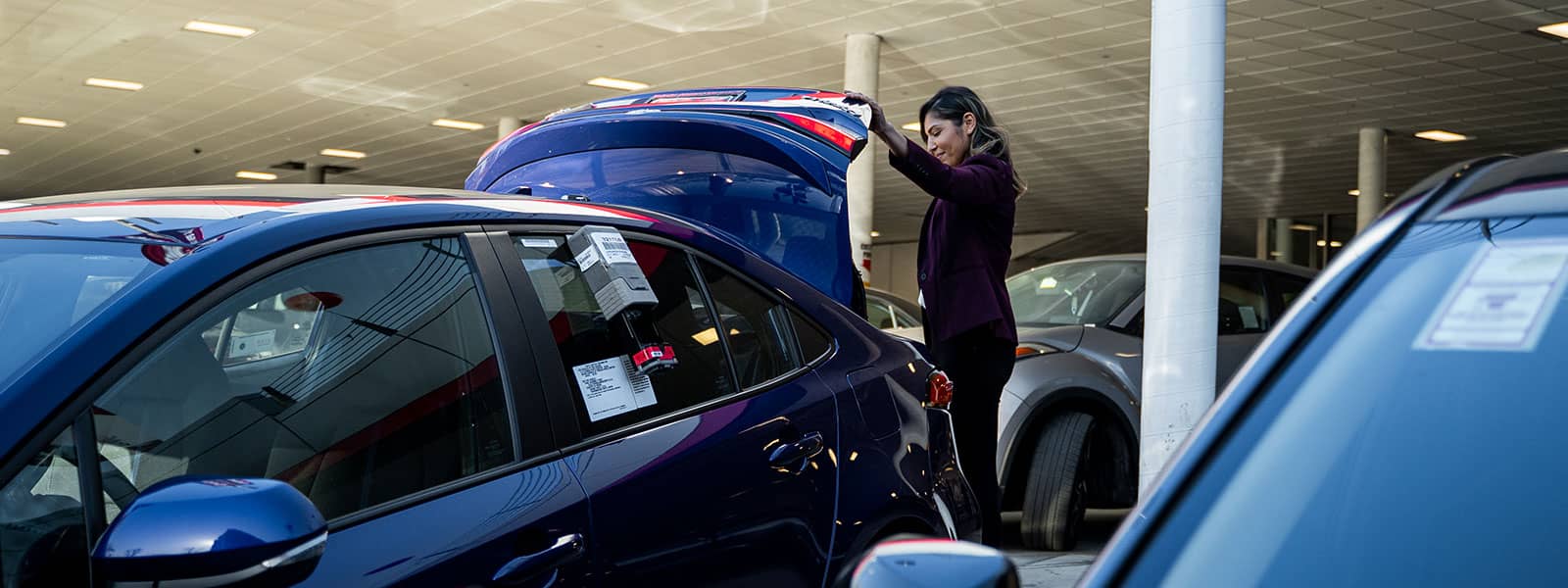How to Get the Best Deal on a Car from a Dealership
Posted Thursday, Jun 08, 2023
Car From A Dealership.
 Buying a car from a dealership can be a daunting experience, especially if you're not familiar with the process. However, with a little bit of research and preparation, you can walk away with a great deal on a car that meets your needs and budget. Here are some expert tips to help you navigate the car-buying process at a dealership.
Buying a car from a dealership can be a daunting experience, especially if you're not familiar with the process. However, with a little bit of research and preparation, you can walk away with a great deal on a car that meets your needs and budget. Here are some expert tips to help you navigate the car-buying process at a dealership.
Do Your Research Beforehand.
Before you even step foot in a dealership, it's important to do your research. This includes researching the make and model of the car you're interested in, as well as its market value and any potential discounts or incentives. You should also research the dealership itself, including its reputation and customer reviews. This will give you a better idea of what to expect and help you negotiate a better deal.
One of the biggest mistakes car buyers make is not doing their research beforehand. By taking the time to research the car you want and the dealership you plan to visit, you'll be better equipped to negotiate a fair price and avoid any potential scams or shady sales tactics. Start by researching the make and model of the car you're interested in, including its features, safety ratings, and reliability. You should also research the market value of the car and any potential discounts or incentives that may be available. Additionally, check out customer reviews of the dealership you plan to visit to get a sense of their reputation and customer service. Armed with this knowledge, you'll be able to confidently negotiate a fair deal and drive away in the car of your dreams.
Negotiate the Price of the Car, Not the Monthly Payment.
When negotiating with a dealership, it's important to focus on the price of the car, not the monthly payment. Dealerships may try to distract you with a low monthly payment, but this can often result in a longer loan term and ultimately cost you more in the long run. Instead, negotiate the overall price of the car and then discuss financing options. This will give you more control over the final cost of the vehicle.
It's easy to get caught up in the excitement of buying a new car, but it's important to stay focused on the big picture. Dealerships may try to lure you in with a low monthly payment, but this can often be a trap. A longer loan term may result in a lower monthly payment, but it will also mean paying more in interest over time. Instead, negotiate the price of the car itself. This will give you more control over the final cost of the vehicle. Once you've agreed on a price, then you can discuss financing options and find the best deal for your budget. Remember, the goal is to get the best overall value for your money, not just a low monthly payment.
Be Prepared to Walk Away.
One of the most important things to remember when negotiating with a dealership is to be prepared to walk away. If the dealership is not willing to meet your price or negotiate in good faith, it's better to walk away and find another dealership that will. Remember, you are the one with the power in this situation, and there are plenty of other dealerships out there that will be willing to work with you. Don't be afraid to stand your ground and hold out for the best deal possible.
Walking away from a dealership can be difficult, especially if you've spent a lot of time negotiating and feel like you're close to a deal. But it's important to remember that you have the power in this situation. If the dealership is not willing to meet your price or negotiate in good faith, it's better to walk away and find another dealership that will. This may mean doing some research and visiting multiple dealerships, but it's worth it to get the best deal possible. Remember, you're making a big investment in a car, so it's important to take your time and find the right dealership and the right car for you.
Don't Fall for Add-Ons and Extras.
When negotiating with a dealership, it's important to remember that they will often try to sell you on add-ons and extras that you may not actually need. These can include things like extended warranties, paint protection, and gap insurance. While some of these may be useful, they can also add up quickly and significantly increase the overall cost of your car. Before agreeing to any add-ons or extras, make sure you understand exactly what they are and whether or not they are worth the additional cost. Don't be afraid to say no if you don't think they are necessary.
Dealerships often make a significant portion of their profits from add-ons and extras, so they will likely push them hard during the negotiation process. However, it's important to remember that you have the power to say no. Before agreeing to any extras, do your research and determine whether or not they are truly necessary. For example, extended warranties may be useful for some buyers, but they may not be worth the cost for others. Similarly, paint protection and gap insurance may be unnecessary if you already have adequate coverage through your existing insurance policy. By being informed and standing firm, you can avoid falling for unnecessary add-ons and extras and save yourself a significant amount of money in the process.
Consider Financing Options Outside of the Dealership.
While it may be convenient to finance your car through the dealership, it's not always the best option. Dealerships often work with specific lenders and may not offer the best interest rates or terms. Before agreeing to dealership financing, shop around and compare rates from other lenders such as banks or credit unions. You may be able to find a better deal and save money in the long run. Additionally, having pre-approved financing before you go to the dealership can give you more bargaining power and help you negotiate a better deal on the car itself.
When it comes to financing a car from a dealership, it's important to consider all of your options. While the convenience of dealership financing may be tempting, it's important to shop around and compare rates from other lenders. Banks and credit unions may offer better interest rates and terms, which can save you money in the long run. Plus, having pre-approved financing before you go to the dealership can give you more bargaining power and help you negotiate a better deal on the car itself. So, take the time to research and compare financing options before making a decision. It could end up saving you a lot of money in the long run.
While dealership financing may seem like the easiest option, it's important to remember that they are ultimately trying to make a profit. This means that they may not always offer the best interest rates or terms. By shopping around and comparing rates from other lenders, such as banks and credit unions, you may be able to find a better deal. Additionally, having pre-approved financing before you go to the dealership can give you more bargaining power and help you negotiate a better deal on the car itself. So, take the time to research and compare financing options before making a decision. It could end up saving you a lot of money in the long run.
Check The Best Used Car Deals Near You!


